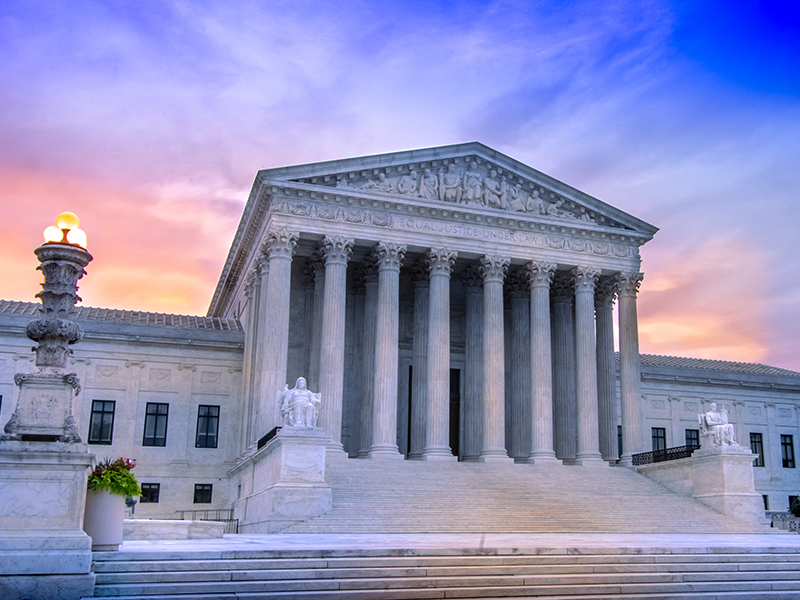

The U.S. Supreme Court’s decision to end the nation’s constitutional protections for abortion has catapulted employers of all types into the most divisive corner of politics.
Some companies that stayed silent last month — when a draft opinion by Justice Samuel Alito was leaked to Politico — have spoken up for the first time, including the Walt Disney Co., which said it will reimburse employees who must travel out of state to get an abortion.
American Express Co., Bank of America Corp., Goldman Sachs Group Inc. and Facebook parent Meta Platforms Inc. also said they’ll cover employee travel costs, while others like Apple Inc., Lyft Inc., Starbucks Corp. and Yelp Inc. reiterated previous announcements taking similar action. Outdoor clothing maker Patagonia Inc. went so far as to post on LinkedIn that it would provide “training and bail for those who peacefully protest for reproductive justice” and time off to vote.
Read: U.S. employers enhancing benefits plans with travel coverage for abortion
“This ruling puts women’s health in jeopardy, denies them their human rights and threatens to dismantle the progress we’ve made toward gender equality in the workplace since [Roe v. Wade],” wrote Jeremey Stoppelman, co-founder and chief executive officer of Yelp Inc., in an emailed statement to Benefits Canada. “Business leaders must step up to support the health and safety of their employees by speaking out against the wave of abortion bans that will be triggered as a result of this decision and call on Congress to codify Roe v. Wade into law.”
A lot is at stake for companies, many of which have publicly pledged to promote women’s equality and advancement in the workplace. For those in states with restrictive abortion laws, they could now face big challenges in attracting college-educated workers who can easily move around.
Luis von Ahn, chief executive officer of software company Duolingo, sent a tweet Friday aimed at lawmakers in Pennsylvania, where the company is headquartered. “If PA makes abortion illegal, we won’t be able to attract talent and we’ll have to grow our offices elsewhere.”
Read: Canadian employers increasing focus on social responsibilities in 2021: report
Emily M. Dickens, chief of staff and head of government affairs for the Society for Human Resource Management, says nearly a quarter of organizations in a recent poll agreed offering a health-care spending account to cover travel for reproductive care in another state will enhance their ability to compete for talent. “But how these policies interact with state laws is unclear and employers should be aware of the legal risks involved.”
Dickens notes companies that use a third-party administrator to process claims on their behalf — typically big employers — are subject to the Employee Retirement Income Security Act rather than state law. But companies that have to buy their own health insurance for their employees — typically small businesses — are subject to state regulations and have less flexibility in designing benefits plans.
In his concurring opinion released Friday, Justice Brett Kavanaugh suggested it would be unconstitutional for a state to bar residents from traveling to another state to get an abortion. “In my view, the answer is not based on the constitutional right to interstate travel.”
But a company’s right to fund what would be an illegal act in another state is still questionable, argues Teresa Collett, a law professor at the University of St. Thomas. “That’s not an interstate commerce question, per se. So you’d need the right plaintiff.”
Read: Ontario joins Alberta, New Brunswick in making abortion pill available for free
The Supreme Court ruling comes at a time when companies have become increasingly reliant on women to fill jobs and especially as they face a nationwide labor shortage. Women now account for nearly 50 per cent of the U.S. workforce, up dramatically from 37.5 per cent in 1970 — three years before the Supreme Court ruled abortions to be legal in Roe vs. Wade — according to the Bureau of Labor Statistics.
Denied access to abortion could hit low-income workers the hardest because they’re typically in jobs with fewer protections and that are also demanding, from loading groceries onto store shelves to working as a health aide.
“As a direct result of this ruling, more women will be forced to choose between paying their rent or traveling long distances to receive safe abortion care,” says Mary Kay Henry, international president of the Service Employees International Union, which represents nearly two million janitors, health-care workers and teachers in the U.S. “Working women are already struggling in poverty-wage jobs without paid leave and many are also shouldering the caregiving responsibilities for their families, typically unpaid.”
Read: Feds’ proposed change to METC could expand workplace coverage of fertility services
Maurice Schweitzer, a professor at the University of Pennsylvania’s Wharton School of Business, says companies are taking a stand on the court’s ruling because their customers and employees are expecting them to speak out. “We’re in this moment in time where we’re expecting corporate leaders to also be leaders in the political sphere. A lot of employees expect to work in companies that not only pay them well, but whose values are aligned with theirs.”
But the vast majority of executives will likely avoid the topic and focus on things like inflation or supply chain disruptions, he says, noting that approach also comes with risks. “They can either support travel for out-of-state care and risk lawsuits and the ire of local politicians or they can choose to not include this coverage and risk the ire of employees.”
